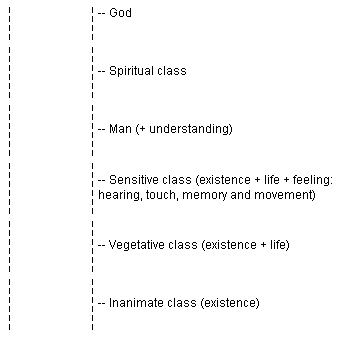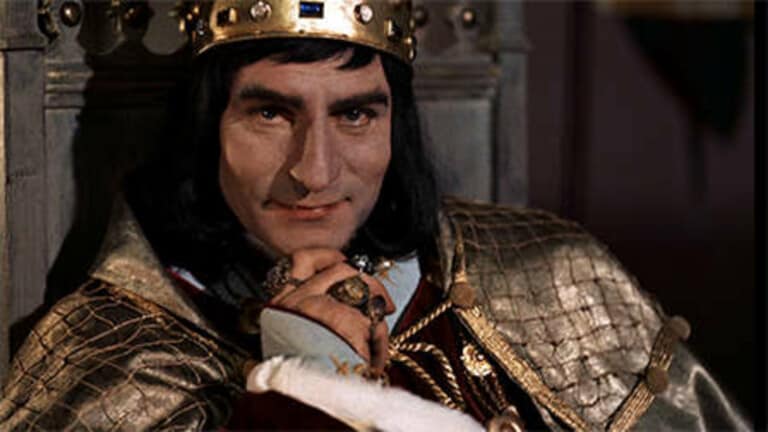It is very often an issue in Shakespeare’s plays. It deals with order and degree: each thing in the Universe has a place in a scale of things.
It is more than a political doctrine: it implies a metaphysical organization of the Universe, which is also linked with theology. We cannot find an exponent of this doctrine, it is everywhere at the back of people’s minds. It is a world picture in the collective unconscious consciousness.
Disorder is the equivalent of the original chaos (as opposed to the cosmos). God sustains the world as ordered, holding everything into place: he did not create it once and for all.
Order is how you can judge disorder. The notion of sin also intervenes, at several levels (in the Bible…) :
- Revolt of the Bad Angels with Satan
- Fall of Man from the Garden of Eden
- The murder of Abel by Cain
It constitutes frames of reference for the Elizabethan. Sin is the reason for chaos and disorder. The ordering of the world is very complex and means a very specific organization. Everything has a place, even the slightest one.
They conceived the world as a scale, an infinite ladder with infinite degrees: each thing is both superior and inferior to something else. It is a hierarchical order of things, known as “The Great Chain of Beings”.
One can notice that only Hell escapes this ladder :

Man has all the possibilities of earthly existence (he forms a microcosm in the macrocosm of the Universe). The inanimate class nourishes the vegetative class that nourishes… and so on.
Man aspires to the spiritual class. It is very closely linked: the bottom of one class is connected with the top of another class. It is a system of infinite diversity and unity of the Universe.
There is a primate in each class :
- Birds: eagle
- Trees: oak
- Elements: fire
- Man: King
- Stars: sun
- Values: justice
- Body: head
Man is close to animals in sensuality and to angels in understanding: he is a nodal. For the Elizabethan, man was really himself when he was social. That is why morals and politics were far more important at that time than science.
Man is between Matter and Nature. It is a source of internal conflict because he is always trying to bridge the cosmic gap (to reconcile) between the angel and the beast within him.
Macbeth is representative of the human condition but Richard is definitely evil. This brings us to the difference between being amoral and being immoral.
Someone who is amoral does not have a moral because he does not know what morality is. On the contrary, someone immoral knows exactly what is moral but chooses to turn his back on it. Richard is definitely immoral.
For the Elizabethans, Nature and Creation had done things for the best. That is why Richard accuses Nature and puts the blame on the Creation for being deformed. If he had accepted his rank in the order of things, he would have been right.
The order of things -the Cosmos- is also based on a series of correspondences between the several levels of beings.
- heavenly order: God
- macrocosm: World, Nature (“sub-lunar level”)
- the state: the political body
- the body: the natural body
Each element at a certain level has another correspondence in another level. In Richard III, Richard the Tyrant (state) is a cripple (body) and at the beginning, the King is sick because the State is sick. In Macbeth, there is an eclipse after Duncan’s death.
The question of evil
The main problem is the question of Evil. How can Evil be possible in a perfect world? Man yielded to the temptation of Evil and sinned. God allowed havoc as a punishment for man’s sins.
Man is the only creature who was given freedom of will and the choice of his actions. He chose transgression and brought about Evil. Havoc happened because of man but it was also part of God’s plans. Everything is determined by God for the Elizabethans.
In the end, we realize that transgressors are always punished by God, whereas they were successful in the beginning.
This was not the Elizabethan picture but the Middle Ages” one. In the 16th and 17th centuries, this world vision has already been questioned by several thinkers, especially by Machiavelli, who believed neither in law and order nor in man’s basic goodness.
On one hand, man was capable of understanding what was good (Erected Wit) but on the other hand, there was evil temptation (Infected Will).
For Machiavelli, man is prone to Evil and disorder is the natural state of man, not the exception. Man is not idealistic but completely cynical.
Machiavelli said that through will and determination, man could reach power. The success story of Richard is a mere illustration of The Prince.
Richard’s role is that of the Scourge of God. From the start, he is determined by God but does not realize it.
In the end, machiavellian success is always part of God’s success. See the Wheel of Fortune, ruled by Providence and therefore by God.

